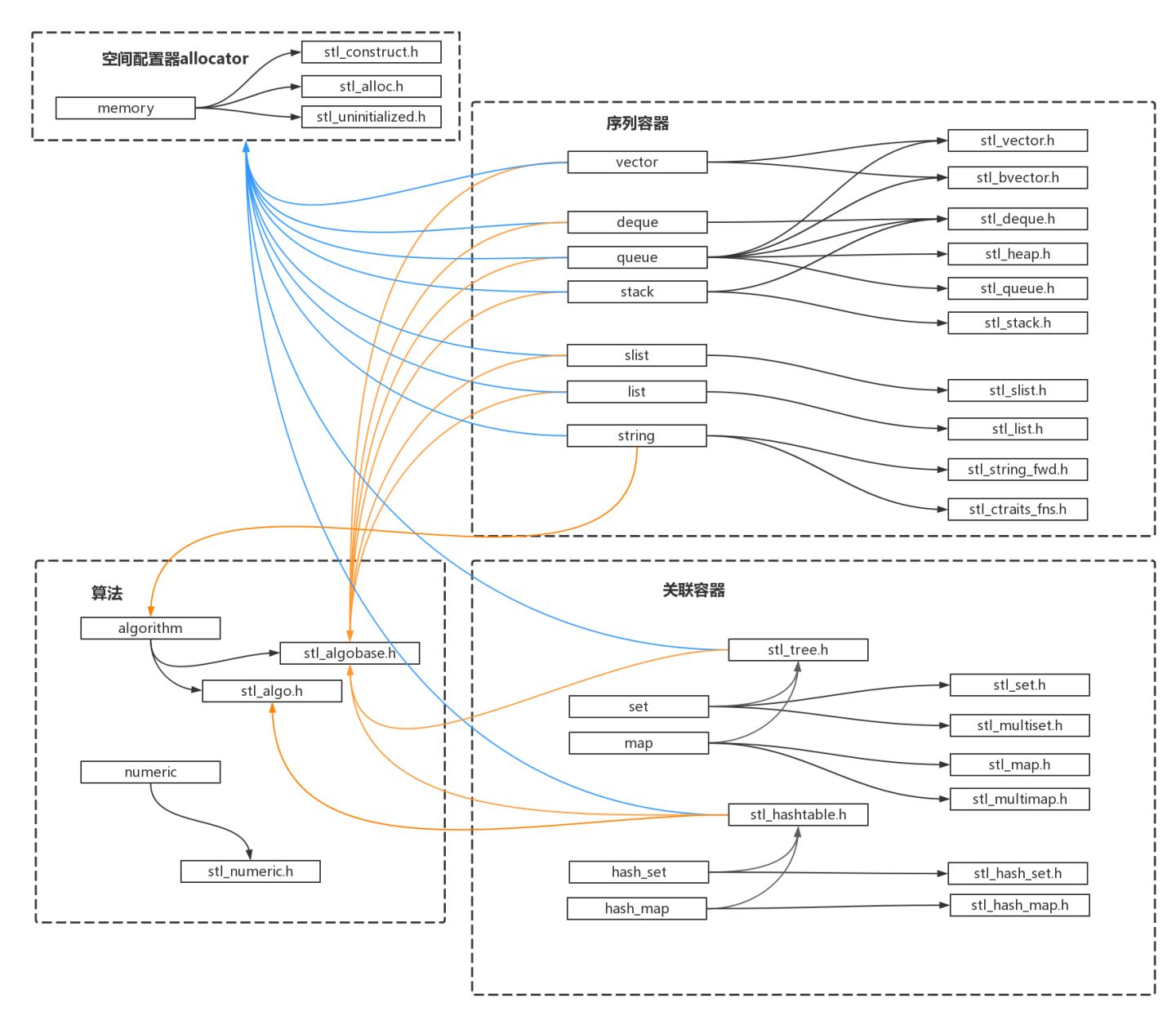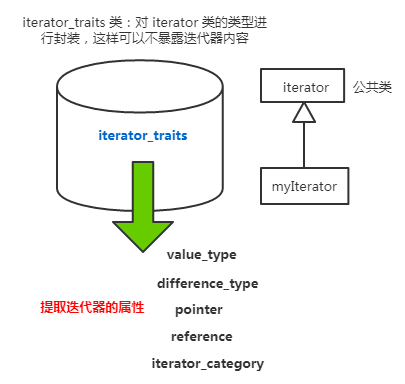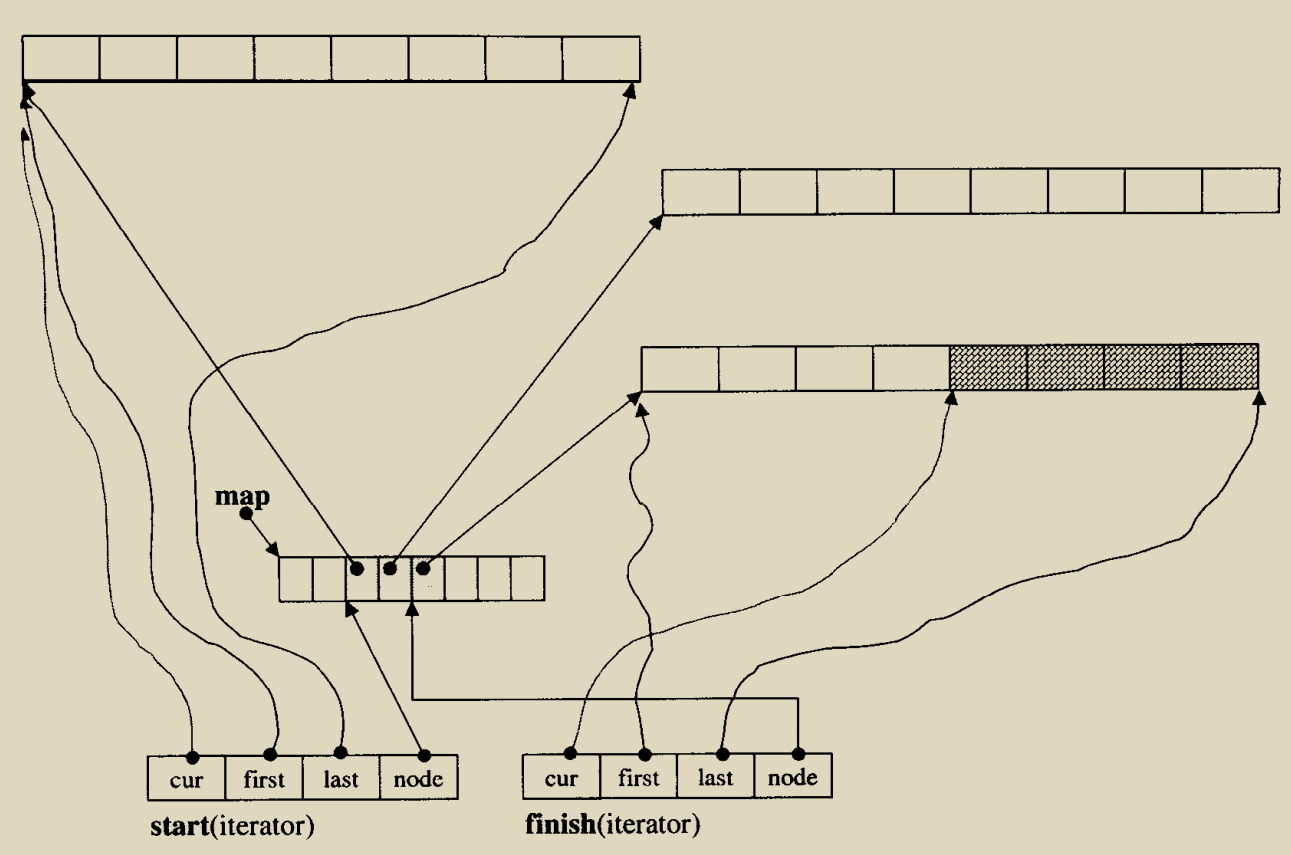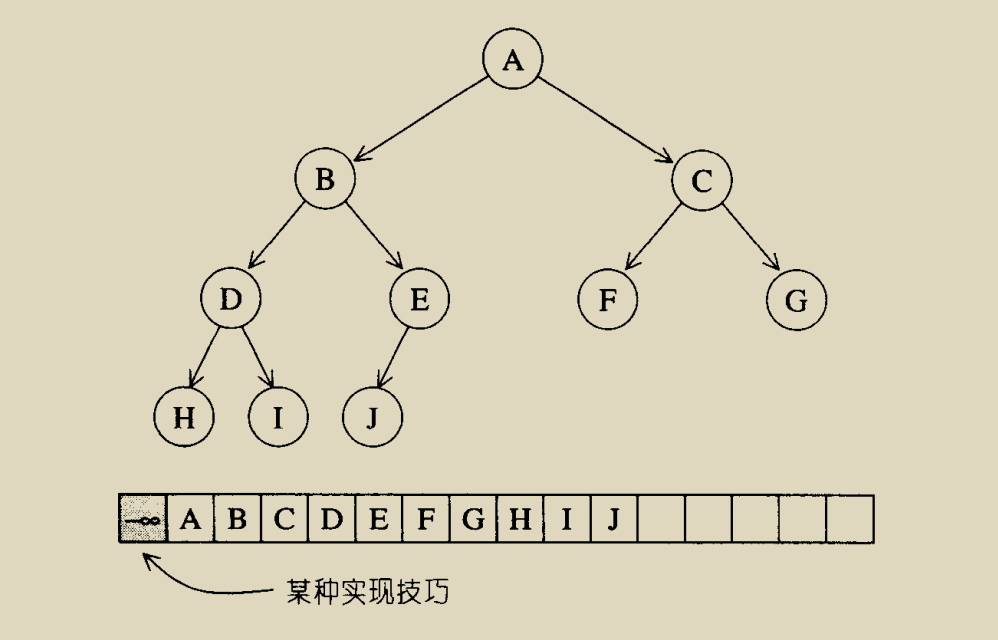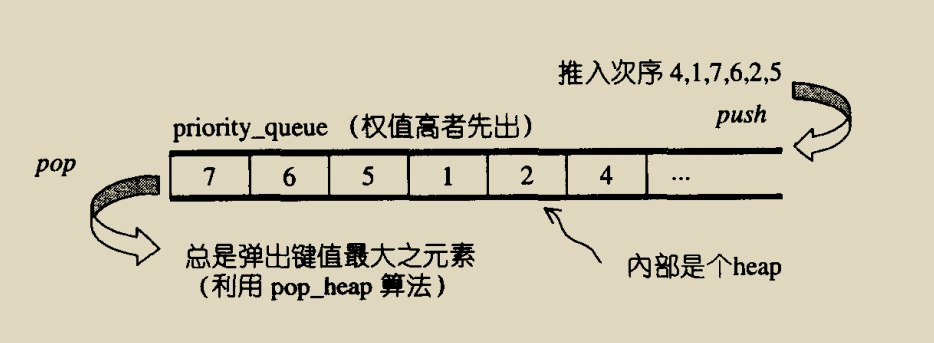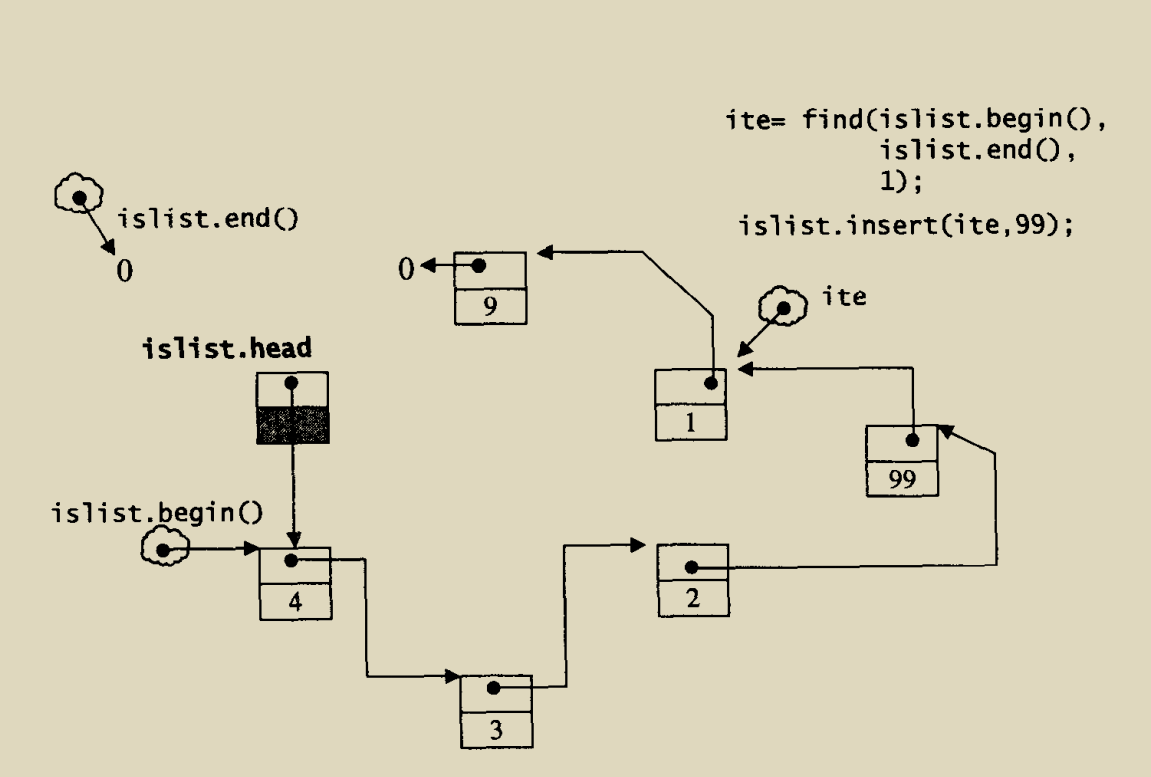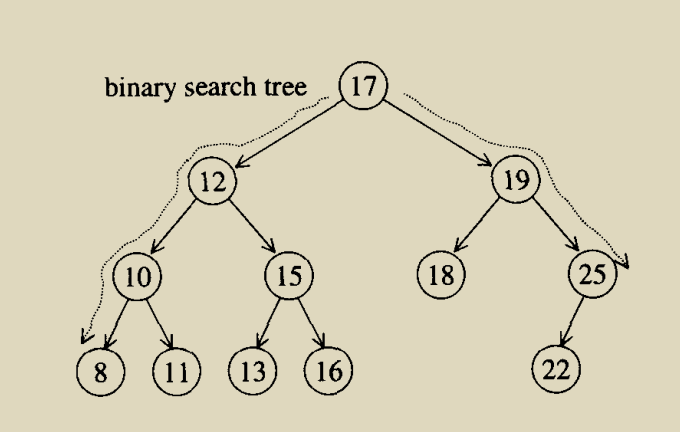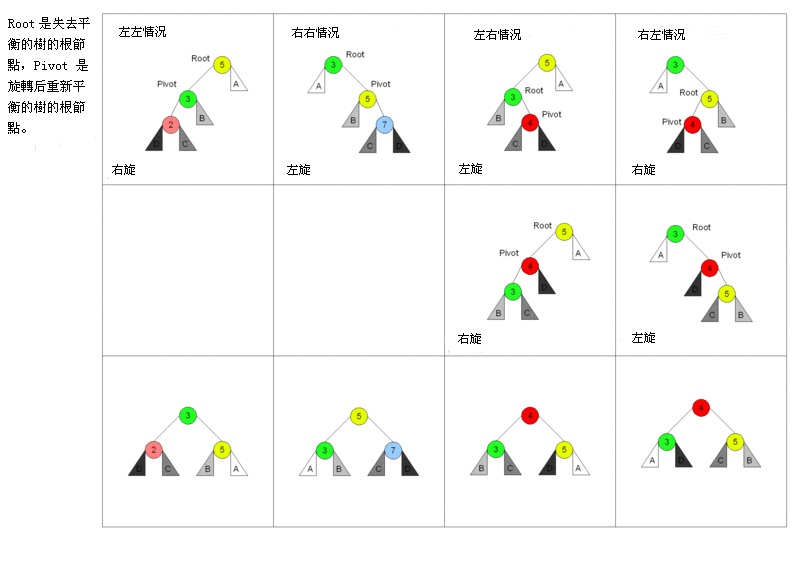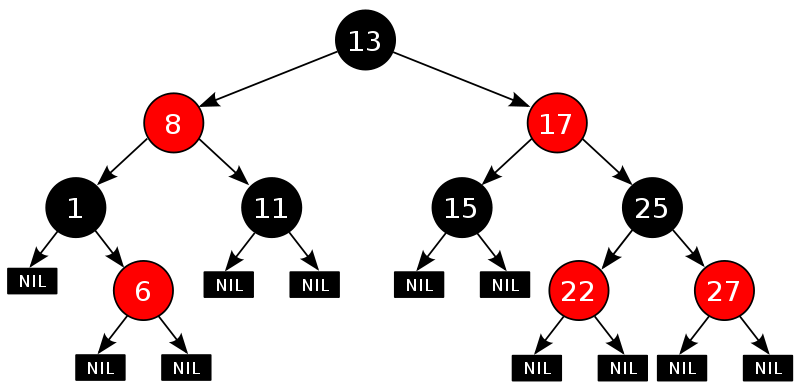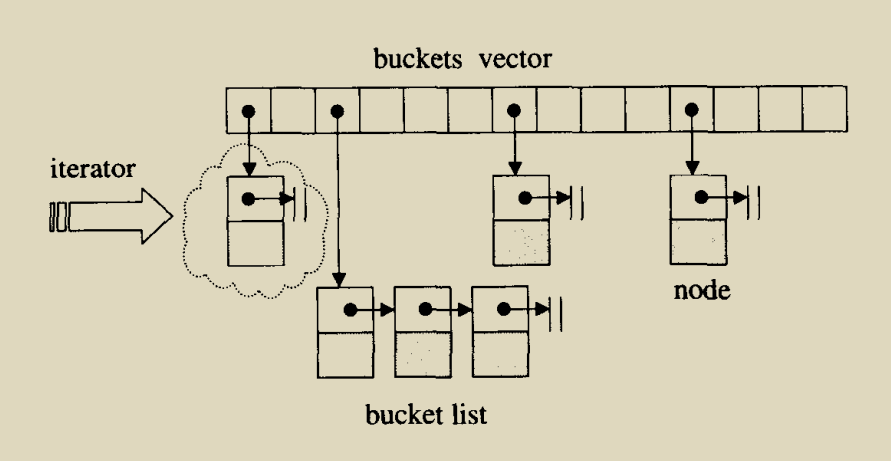STL源码剖析笔记
- STL源码剖析
该文记录《STL源码剖析》个人理解。
STL源码剖析
1. STL简介
1.1. STL版本
STL 是一个标准,只规定了 STL 的接口,内部实现没有要求。STL 有许多实现版本,PJ STL(被Visual C++采用),RW STL等。
SGI STL 版本注释丰富,结构清晰,可读性最强,同时它也被 GCC 采用,所以是最流行的版本。
书里使用的是 SGI_STL_3.3。
1.2. STL组件
STL分为六大组件:
- 容器(container):常用数据结构,大致分为两类,序列容器,如
vector,list,deque,关联容器,如set,map。在实现上,是类模板(class template) - 迭代器(iterator):一套访问容器的接口,行为类似于指针。它为不同算法提供的相对统一的容器访问方式,使得设计算法时无需关注过多关注数据。(“算法”指广义的算法,操作数据的逻辑代码都可认为是算法)
- 算法(algorithm):提供一套常用的算法,如
sort,search,copy,erase,在实现上可以认为是一种函数模板(function template)。 - 配置器(allocator):为容器提供空间配置和释放,对象构造和析构的服务,也是一个类模板。
- 仿函数(functor):作为函数使用的对象,用于泛化算法中的操作。
- 配接器(adapter):将一种容器修饰为功能不同的另一种容器,如以容器
deque为基础,在其上实现stack就是一种配接器。除此之外,还有迭代器配接器和仿函数配接器。
1.3. STL文件关系
这是部分 STL 文件的包含关系:
2. 空间配置器(allocator)
图中左上角为空间配置器,通常我们可以在代码中用 #include <memory> 来包含它,它的实际实现在三个文件中:
stl_construct.h:定义了全局函数construct()和destroy(),负责对象的构造和析构。stl_alloc.h:定义了一、二级配置器,配置器名为alloc。stl_uninitialized.h:定义了全局函数,用来填充(fill)或复制(copy)大块内存数据。
注意看所有蓝色箭头,所有的容器都直接或间接的包含了 allocator,说明所有的容器都依赖 allocator 来管理空间。
配置器:负责空间配置与管理,从实现的角度来看,配置器是一个实现了动态空间配置、空间管理、空间释放的 class template。
空间配置器:整个 STL 的操作对象(所有的数值)都存放在容器之内,而容器一定需要配置空间以存放内容。
1
2
3
4
5
6
7
8
9
10
11
12
13
14
15
16
17
18
19
20
21
22
23
24
25
26
27
28
29
30
31
32
33
34
35
36
37
38
39
40
41
42
43
44
45
46
47
48
49
50
51
52
53
54
55
56
57
58
59
60
61
62
63
64
65
66
template <int __inst>
class __malloc_alloc_template {
private:
static void* _S_oom_malloc(size_t);
static void* _S_oom_realloc(void*, size_t);
public:
// 使用 malloc 其中 _S_oom_malloc 直到分配空间成功为止
static void* allocate(size_t __n)
{
void* __result = malloc(__n);
if (0 == __result) __result = _S_oom_malloc(__n);
return __result;
}
static void deallocate(void* __p, size_t /* __n */)
{
free(__p);
}
// 使用 realloc 其中 _S_oom_realloc 直到分配空间成功为止
static void* reallocate(void* __p, size_t /* old_sz */, size_t __new_sz)
{
void* __result = realloc(__p, __new_sz);
if (0 == __result) __result = _S_oom_realloc(__p, __new_sz);
return __result;
}
static void (* __set_malloc_handler(void (*__f)()))()
{
void (* __old)() = __malloc_alloc_oom_handler;
__malloc_alloc_oom_handler = __f;
return(__old);
}
};
template <int __inst>
void*
__malloc_alloc_template<__inst>::_S_oom_malloc(size_t __n)
{
void (* __my_malloc_handler)();
void* __result;
for (;;) {
__my_malloc_handler = __malloc_alloc_oom_handler;
if (0 == __my_malloc_handler) { __THROW_BAD_ALLOC; }
(*__my_malloc_handler)();
__result = malloc(__n);
if (__result) return(__result);
}
}
template <int __inst>
void* __malloc_alloc_template<__inst>::_S_oom_realloc(void* __p, size_t __n)
{
void (* __my_malloc_handler)();
void* __result;
for (;;) {
__my_malloc_handler = __malloc_alloc_oom_handler;
if (0 == __my_malloc_handler) { __THROW_BAD_ALLOC; }
(*__my_malloc_handler)();
__result = realloc(__p, __n);
if (__result) return(__result);
}
}
空间配置器具体实现
1
2
3
4
5
6
7
8
9
10
11
12
13
14
15
16
17
18
19
20
21
22
23
24
25
26
27
28
29
30
31
32
33
34
35
36
37
38
39
40
41
42
43
44
template <class _Tp>
class allocator {
// typedef __malloc_alloc_template<0> malloc_alloc;
// typedef malloc_alloc alloc;
// 所以调用的就是 __malloc_alloc_template
typedef alloc _Alloc;
public:
typedef size_t size_type;
typedef ptrdiff_t difference_type;
typedef _Tp* pointer;
typedef const _Tp* const_pointer;
typedef _Tp& reference;
typedef const _Tp& const_reference;
typedef _Tp value_type;
template <class _Tp1> struct rebind {
typedef allocator<_Tp1> other;
};
allocator() __STL_NOTHROW {}
allocator(const allocator&) __STL_NOTHROW {}
template <class _Tp1> allocator(const allocator<_Tp1>&) __STL_NOTHROW {}
~allocator() __STL_NOTHROW {}
pointer address(reference __x) const { return &__x; }
const_pointer address(const_reference __x) const { return &__x; }
// __n is permitted to be 0. The C++ standard says nothing about what
// the return value is when __n == 0.
_Tp* allocate(size_type __n, const void* = 0) {
return __n != 0 ? static_cast<_Tp*>(_Alloc::allocate(__n * sizeof(_Tp)))
: 0;
}
// __p is not permitted to be a null pointer.
void deallocate(pointer __p, size_type __n)
{ _Alloc::deallocate(__p, __n * sizeof(_Tp)); }
size_type max_size() const __STL_NOTHROW
{ return size_t(-1) / sizeof(_Tp); }
void construct(pointer __p, const _Tp& __val) { new(__p) _Tp(__val); }
void destroy(pointer __p) { __p->~_Tp(); }
};
在 C++11 版本后, new 代替 malloc 和 realloc,delete 代替 free。
3. 迭代器(iterators)
3.1. 迭代器是一种智能指针
迭代器是一种行为类似指针的对象,而指针的各种行为中最常见的用途是
dereference和member access。迭代器最重要的就是对operator*和operator->进行重载工作。每一种
STL容器都提供有专属迭代器。
3.2. 迭代器相应类型
迭代器相应类型有五种:
value typedifference typepointerreferenceiterator category
1
2
3
4
5
6
7
8
9
template <class _Category, class _Tp, class _Distance = ptrdiff_t,
class _Pointer = _Tp*, class _Reference = _Tp&>
struct iterator {
typedef _Category iterator_category;
typedef _Tp value_type; // 对象的类型
typedef _Distance difference_type; // 迭代器之间距离
typedef _Pointer pointer; // 指针
typedef _Reference reference; // 引用
};
3.3. Traits 编程技术
traits 意为 “特性”,扮演 “特性萃取机” 角色,萃取各个迭代器的特性(相应类型)。
模板偏特化(template partial specialization):针对 template 参数更进一步的条件限制所设计出来的一个特化版本,本身仍然是 template。
1
2
3
4
5
6
7
8
template <class _Iterator>
struct iterator_traits {
typedef typename _Iterator::iterator_category iterator_category;
typedef typename _Iterator::value_type value_type;
typedef typename _Iterator::difference_type difference_type;
typedef typename _Iterator::pointer pointer;
typedef typename _Iterator::reference reference;
};
- 迭代器相应类型之五:iterator_category
- 输入迭代器 (InputIterator) 是能从所指向元素读取的迭代器 (Iterator) 。输入迭代器 (InputIterator) 仅保证单趟算法的合法性。
- 输出迭代器 (OutputIterator) 是能写入所指元素的迭代器 (Iterator) 。
- 向前迭代器 (ForwardIterator) 是一种能从所指向元素读取数据的迭代器 (Iterator) 。
- 双向迭代器 (BidirectionalIterator) 是能双向移动(即自增与自减)的向前迭代器 (ForwardIterator) 。
- 随机访问迭代器 (RandomAccessIterator) 是能在常数时间内移动到指向任何元素的双向迭代器 (BidirectionalIterator) 。
3.4. 总结
traits本质多一层间接性,换来灵活性。iterator_traits负责萃取迭代器的特性,__type_traits负责萃取类型的特性。
4. 容器(containers)
容器:包括序列式容器和关联式容器;即各种数据结构,如 vector,list,deque,set,map 等用来存储数据;从实现的角度来看,STL 容器是一种 class template。
任何特定的数据结构都是为了实现某种特定的算法。
4.1. 序列式容器(sequence container)
4.1.1. vector
vector 是单向连续的线性空间。
1
2
3
4
5
6
7
8
9
10
11
12
13
14
15
16
17
18
19
20
21
22
23
24
25
26
27
28
29
template <class _Tp, class _Alloc>
class _Vector_base {
public:
typedef _Alloc allocator_type;
allocator_type get_allocator() const { return allocator_type(); }
_Vector_base(const _Alloc&)
: _M_start(0), _M_finish(0), _M_end_of_storage(0) {}
_Vector_base(size_t __n, const _Alloc&)
: _M_start(0), _M_finish(0), _M_end_of_storage(0)
{
_M_start = _M_allocate(__n);
_M_finish = _M_start;
_M_end_of_storage = _M_start + __n;
}
~_Vector_base() { _M_deallocate(_M_start, _M_end_of_storage - _M_start); }
protected:
_Tp* _M_start; // 首地址
_Tp* _M_finish; // 实际空间尾地址
_Tp* _M_end_of_storage; // 分配空间尾地址
typedef simple_alloc<_Tp, _Alloc> _M_data_allocator;
_Tp* _M_allocate(size_t __n)
{ return _M_data_allocator::allocate(__n); }
void _M_deallocate(_Tp* __p, size_t __n)
{ _M_data_allocator::deallocate(__p, __n); }
};
该类是 vector (数组)基类,其中成员 _M_start 是首地址, _M_finish 是实际空间尾地址, _M_end_of_storage 是分配空间尾地址,所有操作都是基于这三个成员操作。
当插入时内存空间不足时会申请实际大小的两倍空间,并将原来数据拷贝到新分配地址,并销毁原来地址空间。
1
2
3
4
5
6
7
8
9
10
11
12
13
14
15
16
17
18
19
20
21
22
23
24
25
26
27
28
29
30
31
32
33
template <class _Tp, class _Alloc>
void
vector<_Tp, _Alloc>::_M_insert_aux(iterator __position, const _Tp& __x)
{
// 实际空间尾地址 小于 分配空间尾地址
if (_M_finish != _M_end_of_storage) {
construct(_M_finish, *(_M_finish - 1));
++_M_finish;
_Tp __x_copy = __x;
copy_backward(__position, _M_finish - 2, _M_finish - 1);
*__position = __x_copy;
}
else {
const size_type __old_size = size();
// 重新申请两倍空间
const size_type __len = __old_size != 0 ? 2 * __old_size : 1;
iterator __new_start = _M_allocate(__len);
iterator __new_finish = __new_start;
__STL_TRY {
__new_finish = uninitialized_copy(_M_start, __position, __new_start);
construct(__new_finish, __x);
++__new_finish;
__new_finish = uninitialized_copy(__position, _M_finish, __new_finish);
}
__STL_UNWIND((destroy(__new_start,__new_finish),
_M_deallocate(__new_start,__len)));
destroy(begin(), end());
_M_deallocate(_M_start, _M_end_of_storage - _M_start);
_M_start = __new_start;
_M_finish = __new_finish;
_M_end_of_storage = __new_start + __len;
}
}
4.1.2. list
list 是一个双向链表。
1
2
3
4
5
6
7
8
9
10
11
12
13
14
15
16
17
18
19
20
21
22
23
24
25
26
27
28
29
30
31
32
33
34
35
36
37
struct _List_node_base {
_List_node_base* _M_next; // 下一个地址
_List_node_base* _M_prev; // 上一个地址
};
template <class _Tp>
struct _List_node : public _List_node_base {
_Tp _M_data; // 存放数据
};
template <class _Tp, class _Alloc>
class _List_base
{
public:
typedef _Alloc allocator_type;
allocator_type get_allocator() const { return allocator_type(); }
_List_base(const allocator_type&) {
_M_node = _M_get_node();
_M_node->_M_next = _M_node;
_M_node->_M_prev = _M_node;
}
~_List_base() {
clear();
_M_put_node(_M_node);
}
void clear();
protected:
typedef simple_alloc<_List_node<_Tp>, _Alloc> _Alloc_type;
_List_node<_Tp>* _M_get_node() { return _Alloc_type::allocate(1); }
void _M_put_node(_List_node<_Tp>* __p) { _Alloc_type::deallocate(__p, 1); }
protected:
_List_node<_Tp>* _M_node; // 因为是环形链表,_M_node 是尾节点,_M_node->next 是头节点
};
该类是 list (链表)基类,该容器是不连续的,其中成员 _M_node 是一个节点指针,该节点包含 _M_data 数据,_M_next 下一个节点地址, _M_prev 上一个节点地址,所有操作都是基于节点操作。
插入是在节点之间插入。
1
2
3
4
5
6
7
8
iterator insert(iterator __position, const _Tp& __x) {
_Node* __tmp = _M_create_node(__x);
__tmp->_M_next = __position._M_node;
__tmp->_M_prev = __position._M_node->_M_prev;
__position._M_node->_M_prev->_M_next = __tmp; // 尾插法
__position._M_node->_M_prev = __tmp;
return __tmp;
}
4.1.3. deque
deque 是双向的连续线性空间,由于是数组链表形式,所以开辟空间十分复杂。
1
2
3
4
5
6
7
8
9
10
11
12
13
14
15
16
17
18
19
20
21
22
23
24
25
26
27
28
29
30
31
32
33
34
35
36
37
38
39
40
41
42
43
44
45
46
47
48
49
50
51
52
53
54
55
56
57
58
59
60
61
62
63
64
65
66
67
68
69
70
71
72
73
74
75
76
77
78
79
80
81
82
// 内部缓存区间默认 512 字节大小,求插入数据个数取下限,超过 512 返回 1
inline size_t __deque_buf_size(size_t __size) {
return __size < 512 ? size_t(512 / __size) : size_t(1);
}
template <class _Tp, class _Ref, class _Ptr>
struct _Deque_iterator {
typedef _Deque_iterator<_Tp, _Tp&, _Tp*> iterator;
typedef _Deque_iterator<_Tp, const _Tp&, const _Tp*> const_iterator;
static size_t _S_buffer_size() { return __deque_buf_size(sizeof(_Tp)); }
typedef random_access_iterator_tag iterator_category;
typedef _Tp value_type;
typedef _Ptr pointer;
typedef _Ref reference;
typedef size_t size_type;
typedef ptrdiff_t difference_type;
typedef _Tp** _Map_pointer;
typedef _Deque_iterator _Self;
_Tp* _M_cur; // 缓冲区头地址
_Tp* _M_first; // 缓冲区当前数据地址
_Tp* _M_last; // 缓冲区尾地址
_Map_pointer _M_node; // 中控器
_Deque_iterator(_Tp* __x, _Map_pointer __y)
: _M_cur(__x), _M_first(*__y),
_M_last(*__y + _S_buffer_size()), _M_node(__y) {}
_Deque_iterator() : _M_cur(0), _M_first(0), _M_last(0), _M_node(0) {}
_Deque_iterator(const iterator& __x)
: _M_cur(__x._M_cur), _M_first(__x._M_first),
_M_last(__x._M_last), _M_node(__x._M_node) {}
void _M_set_node(_Map_pointer __new_node) {
_M_node = __new_node;
_M_first = *__new_node;
_M_last = _M_first + difference_type(_S_buffer_size());
}
}
template <class _Tp, class _Alloc>
class _Deque_base {
public:
typedef _Deque_iterator<_Tp,_Tp&,_Tp*> iterator;
typedef _Deque_iterator<_Tp,const _Tp&,const _Tp*> const_iterator;
typedef _Alloc allocator_type;
allocator_type get_allocator() const { return allocator_type(); }
_Deque_base(const allocator_type&, size_t __num_elements)
: _M_map(0), _M_map_size(0), _M_start(), _M_finish() {
_M_initialize_map(__num_elements);
}
_Deque_base(const allocator_type&)
: _M_map(0), _M_map_size(0), _M_start(), _M_finish() {}
~_Deque_base();
protected:
void _M_initialize_map(size_t);
void _M_create_nodes(_Tp** __nstart, _Tp** __nfinish);
void _M_destroy_nodes(_Tp** __nstart, _Tp** __nfinish);
enum { _S_initial_map_size = 8 };
protected:
_Tp** _M_map; // 中控器
size_t _M_map_size; // 中控器大小
iterator _M_start; // 头部迭代器
iterator _M_finish; // 尾部迭代器
typedef simple_alloc<_Tp, _Alloc> _Node_alloc_type;
typedef simple_alloc<_Tp*, _Alloc> _Map_alloc_type;
_Tp* _M_allocate_node()
{ return _Node_alloc_type::allocate(__deque_buf_size(sizeof(_Tp))); }
void _M_deallocate_node(_Tp* __p)
{ _Node_alloc_type::deallocate(__p, __deque_buf_size(sizeof(_Tp))); }
_Tp** _M_allocate_map(size_t __n)
{ return _Map_alloc_type::allocate(__n); }
void _M_deallocate_map(_Tp** __p, size_t __n)
{ _Map_alloc_type::deallocate(__p, __n); }
};
该类 _Deque_base 作为 deque (双端队列)的基类, _Deque_base 的成员是 _Deque_iterator 定义的。_Deque_iterator 中 _M_cur 表示此迭代器缓冲区当前指针地址, _M_first 是此迭代器缓冲区头部指针地址, _M_last 是此迭代器缓冲区尾部指针地址, _M_node 是个一小块连续空间表示缓冲区。
其中 map 是整个连续的空间,由 __deque_buf_size 可知缓冲区是迭代器开辟的 512 字节空间。其中最关键的是 set_node 函数,当迭代器到达缓冲区边缘需要进行跳缓冲区。
1
2
3
4
5
6
7
8
9
10
11
12
13
14
15
16
17
18
19
20
21
22
23
24
25
26
27
28
29
template <class _Tp, class _Alloc>
typename deque<_Tp, _Alloc>::iterator
deque<_Tp,_Alloc>::_M_insert_aux(iterator __pos, const value_type& __x)
{
difference_type __index = __pos - _M_start; // 插入点之前的元素个数
value_type __x_copy = __x;
if (size_type(__index) < this->size() / 2) { // 如果插入点之前的个数比较少
push_front(front()); // 在最前端加入与第一元素同值的元素,空间不足会进行扩容
iterator __front1 = _M_start; // 以下标示记号,然后进行元素移动
++__front1;
iterator __front2 = __front1;
++__front2;
__pos = _M_start + __index;
iterator __pos1 = __pos;
++__pos1;
copy(__front2, __pos1, __front1); // 元素移动
}
else {
push_back(back());
iterator __back1 = _M_finish;
--__back1;
iterator __back2 = __back1;
--__back2;
__pos = _M_start + __index;
copy_backward(__pos, __back2, __back1);
}
*__pos = __x_copy; // 在插入点设定新值
return __pos;
}
重新分配空间路径 push_front(const value_type& __t) -> deque<_Tp,_Alloc>::_M_push_front_aux(const value_type& __t) -> _M_reserve_map_at_front (size_type __nodes_to_add = 1) -> deque<_Tp,_Alloc>::_M_reallocate_map(size_type __nodes_to_add, bool __add_at_front)
1
2
3
4
5
6
7
8
9
10
11
12
13
14
15
16
17
18
19
20
21
22
23
24
25
26
27
28
29
30
31
32
33
34
35
36
37
template <class _Tp, class _Alloc>
void deque<_Tp,_Alloc>::_M_reallocate_map(size_type __nodes_to_add,
bool __add_at_front)
{
size_type __old_num_nodes = _M_finish._M_node - _M_start._M_node + 1;
size_type __new_num_nodes = __old_num_nodes + __nodes_to_add;
// 原来中控器大小 大于 2倍新空间,重新拷贝元素
// 原因:原来分配的空间通过 pop 移除元素但空间还在
_Map_pointer __new_nstart;
if (_M_map_size > 2 * __new_num_nodes) {
__new_nstart = _M_map + (_M_map_size - __new_num_nodes) / 2
+ (__add_at_front ? __nodes_to_add : 0);
if (__new_nstart < _M_start._M_node)
copy(_M_start._M_node, _M_finish._M_node + 1, __new_nstart);
else
copy_backward(_M_start._M_node, _M_finish._M_node + 1,
__new_nstart + __old_num_nodes);
}
// 否则直接分配新空间拷贝
else {
size_type __new_map_size =
_M_map_size + max(_M_map_size, __nodes_to_add) + 2;
_Map_pointer __new_map = _M_allocate_map(__new_map_size);
__new_nstart = __new_map + (__new_map_size - __new_num_nodes) / 2
+ (__add_at_front ? __nodes_to_add : 0);
copy(_M_start._M_node, _M_finish._M_node + 1, __new_nstart);
_M_deallocate_map(_M_map, _M_map_size);
_M_map = __new_map;
_M_map_size = __new_map_size;
}
_M_start._M_set_node(__new_nstart);
_M_finish._M_set_node(__new_nstart + __old_num_nodes - 1);
}
4.1.4. stack
stack 是一种先进后出(First In Last Out, FILO)的数据结构。stack 底层实现是以适配器形式实现,默认的适配器容器是 deque(也可以使用 list)。stack 没有迭代器。
1
2
3
4
5
6
7
8
9
10
11
12
13
14
15
16
17
18
19
20
21
22
23
24
25
26
27
template <class _Tp,
class _Sequence __STL_DEPENDENT_DEFAULT_TMPL(deque<_Tp>) >
class stack;
template <class _Tp, class _Sequence>
class stack {
public:
typedef typename _Sequence::value_type value_type;
typedef typename _Sequence::size_type size_type;
typedef _Sequence container_type;
typedef typename _Sequence::reference reference;
typedef typename _Sequence::const_reference const_reference;
protected:
// 直接使用 deque 类型以及函数
_Sequence c;
public:
stack() : c() {}
explicit stack(const _Sequence& __s) : c(__s) {}
bool empty() const { return c.empty(); }
size_type size() const { return c.size(); }
reference top() { return c.back(); }
const_reference top() const { return c.back(); }
void push(const value_type& __x) { c.push_back(__x); }
void pop() { c.pop_back(); }
};
4.1.5 queue
queue 是一种先进先出(First In First Out, FIFO)的数据结构。queue 底层实现同样是以适配器形式实现,默认的适配器容器是 deque(也可以使用 list)。queue 没有迭代器。
1
2
3
4
5
6
7
8
9
10
11
12
13
14
15
16
17
18
19
20
21
22
23
24
25
26
27
28
29
template <class _Tp,
class _Sequence __STL_DEPENDENT_DEFAULT_TMPL(deque<_Tp>) >
class queue;
template <class _Tp, class _Sequence>
class queue {
public:
typedef typename _Sequence::value_type value_type;
typedef typename _Sequence::size_type size_type;
typedef _Sequence container_type;
typedef typename _Sequence::reference reference;
typedef typename _Sequence::const_reference const_reference;
protected:
// 直接使用 deque 类型以及函数
_Sequence c;
public:
queue() : c() {}
explicit queue(const _Sequence& __c) : c(__c) {}
bool empty() const { return c.empty(); }
size_type size() const { return c.size(); }
reference front() { return c.front(); }
const_reference front() const { return c.front(); }
reference back() { return c.back(); }
const_reference back() const { return c.back(); }
void push(const value_type& __x) { c.push_back(__x); }
void pop() { c.pop_front(); }
};
stack 和 queue 最大区别在于 pop() 函数的实现。
4.1.5. heap
heap 并不是一个 STL 容器组件,是一些算法函数。堆就是一个完全二叉树。可以使用一个技巧将数组映射成一种完全二叉树算法。这个技巧就是将 array 第 0 元素保留,那么当完全二叉树某个节点位于 array 的 i 处时,其左子节点必位于 array 的 2i 处,右子节点必位于 array 的 2i+1 处,其父节点必位于 i/2 处(取整数)。以 array 表述 tree 的方式,称为隐式表述法(implicit representation)。
heap 分类(根据元素排列方式),最大值或最小值在根节点。
max-heap(大顶堆):每个节点的键值都大于或等于其子节点键值。min-heap(小顶堆):每个节点的键值都小于或等于其子节点键值。
4.1.6. priority_queue
priority_queue(优先队列)带有权值观念,其内的元素并非依照被推入的持续排列,而是自动依照元素的权值排列(通常权值以实值表示)。权值最高者排在最前面。
priority_queue 默认使用 max-heap 实现。
1
2
3
4
5
6
7
8
9
10
11
12
13
14
15
16
17
18
19
20
21
22
23
24
25
26
27
28
29
30
31
32
33
34
35
36
37
38
39
40
// 容器默认使用 vector 排序默认从小到大
template <class _Tp,
class _Sequence __STL_DEPENDENT_DEFAULT_TMPL(vector<_Tp>),
class _Compare __STL_DEPENDENT_DEFAULT_TMPL(less<typename _Sequence::value_type>) >
class priority_queue {
public:
typedef typename _Sequence::value_type value_type;
typedef typename _Sequence::size_type size_type;
typedef _Sequence container_type;
typedef typename _Sequence::reference reference;
typedef typename _Sequence::const_reference const_reference;
protected:
_Sequence c;
_Compare comp;
public:
priority_queue() : c() {}
explicit priority_queue(const _Compare& __x) : c(), comp(__x) {}
priority_queue(const _Compare& __x, const _Sequence& __s)
: c(__s), comp(__x)
{ make_heap(c.begin(), c.end(), comp); }
bool empty() const { return c.empty(); }
size_type size() const { return c.size(); }
const_reference top() const { return c.front(); }
void push(const value_type& __x) {
__STL_TRY {
c.push_back(__x);
push_heap(c.begin(), c.end(), comp);
}
__STL_UNWIND(c.clear());
}
void pop() {
__STL_TRY {
pop_heap(c.begin(), c.end(), comp);
c.pop_back();
}
__STL_UNWIND(c.clear());
}
};
4.1.7. slist
slist 是单向链表。
1
2
3
4
5
6
7
8
9
10
11
12
13
14
15
16
17
18
19
20
21
22
23
24
25
26
27
28
29
struct _Slist_node_base
{
_Slist_node_base* _M_next; // 下一个节点
};
template <class _Tp>
struct _Slist_node : public _Slist_node_base
{
_Tp _M_data; // 节点数据
};
struct _Slist_iterator_base
{
typedef size_t size_type;
typedef ptrdiff_t difference_type;
typedef forward_iterator_tag iterator_category;
_Slist_node_base* _M_node; // 头节点
_Slist_iterator_base(_Slist_node_base* __x) : _M_node(__x) {}
void _M_incr() { _M_node = _M_node->_M_next; }
bool operator==(const _Slist_iterator_base& __x) const {
return _M_node == __x._M_node;
}
bool operator!=(const _Slist_iterator_base& __x) const {
return _M_node != __x._M_node;
}
};
slist 因为是单向的,所以节点只包含 _M_next 下一个节点指针, _M_data 当前节点数据。
insert() 是在指定节点前插入
insert_after() 是在指定节点后插入
4.2. 关联式容器(associative container)
4.2.1. tree
4.2.1.1. 二叉搜索树
二叉搜索树(binary search tree):任何节点的键值一定大于其左子树中的每一个节点的键值,并小于其右子树中的每一个节点的键值。左下为最小值,右下为最大值。
4.2.1.2. 平衡二叉搜索树
AVL-tree、RB-tree、AA-tree。
4.2.1.3. AVL树
AVL树(Adelson-Velskii-Landis tree):在二叉搜索树基础上,任何节点的左右子树高度相差最多1。
4.2.1.4. 旋转
4.2.2. RB-tree
红黑树(RB-tree):在二叉搜索树基础上
- 每个节点不是红色就是黑色
- 根节点为黑色
- 如果节点为红,其子节点必须为黑
- 任一节点至 NULL(树尾端)的任何路径,所含的和节点数必须相同
为求方便,视 NULL 为黑节点
4.2.3. set
set 所有元素都会根据元素的键值自动排序,元素的键值就是实值,不会重复。set 的底层机制是 RB-tree。
1
2
3
4
5
6
7
8
9
10
11
12
13
14
15
16
17
18
19
20
21
22
23
24
25
26
27
28
29
30
31
32
33
34
35
36
37
38
39
40
41
42
43
44
45
46
47
48
49
50
51
52
53
54
55
56
57
58
59
60
61
62
63
64
65
66
67
68
69
70
71
72
73
74
75
76
77
78
79
80
81
82
83
84
85
86
87
88
89
// 排序默认从小到大
template <class _Key,
class _Compare __STL_DEPENDENT_DEFAULT_TMPL(less<_Key>),
class _Alloc = __STL_DEFAULT_ALLOCATOR(_Key) >
class set;
template <class _Key, class _Compare, class _Alloc>
class set {
public:
// typedefs:
typedef _Key key_type;
typedef _Key value_type;
typedef _Compare key_compare;
typedef _Compare value_compare;
private:
typedef _Rb_tree<key_type, value_type,
_Identity<value_type>, key_compare, _Alloc> _Rep_type;
_Rep_type _M_t; // 红黑树
public:
typedef typename _Rep_type::const_pointer pointer;
typedef typename _Rep_type::const_pointer const_pointer;
typedef typename _Rep_type::const_reference reference;
typedef typename _Rep_type::const_reference const_reference;
typedef typename _Rep_type::const_iterator iterator;
typedef typename _Rep_type::const_iterator const_iterator;
typedef typename _Rep_type::const_reverse_iterator reverse_iterator;
typedef typename _Rep_type::const_reverse_iterator const_reverse_iterator;
typedef typename _Rep_type::size_type size_type;
typedef typename _Rep_type::difference_type difference_type;
typedef typename _Rep_type::allocator_type allocator_type;
// allocation/deallocation
set() : _M_t(_Compare(), allocator_type()) {}
explicit set(const _Compare& __comp,
const allocator_type& __a = allocator_type())
: _M_t(__comp, __a) {}
// accessors:
key_compare key_comp() const { return _M_t.key_comp(); }
value_compare value_comp() const { return _M_t.key_comp(); }
allocator_type get_allocator() const { return _M_t.get_allocator(); }
iterator begin() const { return _M_t.begin(); }
iterator end() const { return _M_t.end(); }
reverse_iterator rbegin() const { return _M_t.rbegin(); }
reverse_iterator rend() const { return _M_t.rend(); }
bool empty() const { return _M_t.empty(); }
size_type size() const { return _M_t.size(); }
size_type max_size() const { return _M_t.max_size(); }
void swap(set<_Key,_Compare,_Alloc>& __x) { _M_t.swap(__x._M_t); }
// insert/erase
pair<iterator,bool> insert(const value_type& __x) {
pair<typename _Rep_type::iterator, bool> __p = _M_t.insert_unique(__x);
return pair<iterator, bool>(__p.first, __p.second);
}
iterator insert(iterator __position, const value_type& __x) {
typedef typename _Rep_type::iterator _Rep_iterator;
return _M_t.insert_unique((_Rep_iterator&)__position, __x);
}
void erase(iterator __position) {
typedef typename _Rep_type::iterator _Rep_iterator;
_M_t.erase((_Rep_iterator&)__position);
}
size_type erase(const key_type& __x) {
return _M_t.erase(__x);
}
void erase(iterator __first, iterator __last) {
typedef typename _Rep_type::iterator _Rep_iterator;
_M_t.erase((_Rep_iterator&)__first, (_Rep_iterator&)__last);
}
void clear() { _M_t.clear(); }
// set operations:
iterator find(const key_type& __x) const { return _M_t.find(__x); }
size_type count(const key_type& __x) const {
return _M_t.find(__x) == _M_t.end() ? 0 : 1;
}
iterator lower_bound(const key_type& __x) const {
return _M_t.lower_bound(__x);
}
iterator upper_bound(const key_type& __x) const {
return _M_t.upper_bound(__x);
}
pair<iterator,iterator> equal_range(const key_type& __x) const {
return _M_t.equal_range(__x);
}
};
set 的所有操作都只是调用 RB-tree 的操作接口。
4.2.4. map
map 同样所有元素都会根据元素的键值自动排序, map 的所有元素都是 pair,同时拥有键值(key)和实值(value),map 不允许两个元素拥有相同的键值。
1
2
3
4
5
6
7
8
9
10
template <class _T1, class _T2>
struct pair {
typedef _T1 first_type;
typedef _T2 second_type;
_T1 first; // 键值
_T2 second; // 实值
pair() : first(_T1()), second(_T2()) {}
pair(const _T1& __a, const _T2& __b) : first(__a), second(__b) {}
};
pair 是一个结构体,成员是公有的(public)。
1
2
3
4
5
6
7
8
9
10
11
12
13
14
15
16
17
18
19
20
21
22
23
24
25
26
27
28
29
30
31
32
33
34
35
36
37
38
39
40
41
42
43
44
45
46
47
48
49
50
51
52
53
54
55
56
57
58
59
60
61
62
63
64
65
66
67
68
69
70
71
72
73
74
75
76
77
78
79
80
81
82
83
84
85
86
87
88
89
90
91
92
93
94
95
96
97
98
99
100
101
102
103
104
105
106
107
108
109
110
111
112
113
114
115
116
117
118
// 排序默认从小到大
template <class _Key, class _Tp,
class _Compare __STL_DEPENDENT_DEFAULT_TMPL(less<_Key>),
class _Alloc = __STL_DEFAULT_ALLOCATOR(_Tp) >
class map;
template <class _Key, class _Tp, class _Compare, class _Alloc>
class map {
public:
// typedefs:
typedef _Key key_type;
typedef _Tp data_type;
typedef _Tp mapped_type;
typedef pair<const _Key, _Tp> value_type;
typedef _Compare key_compare;
class value_compare
: public binary_function<value_type, value_type, bool> {
friend class map<_Key,_Tp,_Compare,_Alloc>;
protected :
_Compare comp;
value_compare(_Compare __c) : comp(__c) {}
public:
bool operator()(const value_type& __x, const value_type& __y) const {
return comp(__x.first, __y.first);
}
};
private:
typedef _Rb_tree<key_type, value_type,
_Select1st<value_type>, key_compare, _Alloc> _Rep_type;
_Rep_type _M_t; // 红黑树
public:
typedef typename _Rep_type::pointer pointer;
typedef typename _Rep_type::const_pointer const_pointer;
typedef typename _Rep_type::reference reference;
typedef typename _Rep_type::const_reference const_reference;
typedef typename _Rep_type::iterator iterator;
typedef typename _Rep_type::const_iterator const_iterator;
typedef typename _Rep_type::reverse_iterator reverse_iterator;
typedef typename _Rep_type::const_reverse_iterator const_reverse_iterator;
typedef typename _Rep_type::size_type size_type;
typedef typename _Rep_type::difference_type difference_type;
typedef typename _Rep_type::allocator_type allocator_type;
// allocation/deallocation
map() : _M_t(_Compare(), allocator_type()) {}
explicit map(const _Compare& __comp,
const allocator_type& __a = allocator_type())
: _M_t(__comp, __a) {}
map(const map<_Key,_Tp,_Compare,_Alloc>& __x) : _M_t(__x._M_t) {}
map<_Key,_Tp,_Compare,_Alloc>&
operator=(const map<_Key, _Tp, _Compare, _Alloc>& __x)
{
_M_t = __x._M_t;
return *this;
}
// accessors:
key_compare key_comp() const { return _M_t.key_comp(); }
value_compare value_comp() const { return value_compare(_M_t.key_comp()); }
allocator_type get_allocator() const { return _M_t.get_allocator(); }
iterator begin() { return _M_t.begin(); }
const_iterator begin() const { return _M_t.begin(); }
iterator end() { return _M_t.end(); }
const_iterator end() const { return _M_t.end(); }
reverse_iterator rbegin() { return _M_t.rbegin(); }
const_reverse_iterator rbegin() const { return _M_t.rbegin(); }
reverse_iterator rend() { return _M_t.rend(); }
const_reverse_iterator rend() const { return _M_t.rend(); }
bool empty() const { return _M_t.empty(); }
size_type size() const { return _M_t.size(); }
size_type max_size() const { return _M_t.max_size(); }
_Tp& operator[](const key_type& __k) {
iterator __i = lower_bound(__k);
// __i->first is greater than or equivalent to __k.
if (__i == end() || key_comp()(__k, (*__i).first))
__i = insert(__i, value_type(__k, _Tp()));
return (*__i).second;
}
void swap(map<_Key,_Tp,_Compare,_Alloc>& __x) { _M_t.swap(__x._M_t); }
// insert/erase
pair<iterator,bool> insert(const value_type& __x)
{ return _M_t.insert_unique(__x); }
iterator insert(iterator position, const value_type& __x)
{ return _M_t.insert_unique(position, __x); }
void erase(iterator __position) { _M_t.erase(__position); }
size_type erase(const key_type& __x) { return _M_t.erase(__x); }
void erase(iterator __first, iterator __last)
{ _M_t.erase(__first, __last); }
void clear() { _M_t.clear(); }
// map operations:
iterator find(const key_type& __x) { return _M_t.find(__x); }
const_iterator find(const key_type& __x) const { return _M_t.find(__x); }
size_type count(const key_type& __x) const {
return _M_t.find(__x) == _M_t.end() ? 0 : 1;
}
iterator lower_bound(const key_type& __x) {return _M_t.lower_bound(__x); }
const_iterator lower_bound(const key_type& __x) const {
return _M_t.lower_bound(__x);
}
iterator upper_bound(const key_type& __x) {return _M_t.upper_bound(__x); }
const_iterator upper_bound(const key_type& __x) const {
return _M_t.upper_bound(__x);
}
pair<iterator,iterator> equal_range(const key_type& __x) {
return _M_t.equal_range(__x);
}
pair<const_iterator,const_iterator> equal_range(const key_type& __x) const {
return _M_t.equal_range(__x);
}
};
map 的所有操作都只是调用 RB-tree 的操作接口。
4.2.5. multiset
multiset 的特性和用法和 set 完全相同,唯一区别在于它允许键值重复,所以它的插入采用的底层机制是 RB-tree 的 insert_equal() ,而不是 insert_unique()。
1
2
3
4
5
6
7
8
9
10
11
12
13
14
15
16
17
18
19
20
21
22
23
24
25
26
27
28
29
30
31
32
33
34
35
36
37
38
39
40
41
42
43
// 排序默认从小到大
template <class _Key,
class _Compare __STL_DEPENDENT_DEFAULT_TMPL(less<_Key>),
class _Alloc = __STL_DEFAULT_ALLOCATOR(_Key) >
class multiset;
template <class _Key, class _Compare, class _Alloc>
class multiset {
public:
// typedefs: 同 set
// allocation 采用 insert_equal(); deallocation 同 set
multiset(const value_type* __first, const value_type* __last)
: _M_t(_Compare(), allocator_type())
{ _M_t.insert_equal(__first, __last); }
multiset(const value_type* __first, const value_type* __last,
const _Compare& __comp,
const allocator_type& __a = allocator_type())
: _M_t(__comp, __a) { _M_t.insert_equal(__first, __last); }
multiset(const_iterator __first, const_iterator __last)
: _M_t(_Compare(), allocator_type())
{ _M_t.insert_equal(__first, __last); }
multiset(const_iterator __first, const_iterator __last,
const _Compare& __comp,
const allocator_type& __a = allocator_type())
: _M_t(__comp, __a) { _M_t.insert_equal(__first, __last); }
// accessors: 同 set
// insert 采用 insert_equal(); erase 同 set
iterator insert(const value_type& __x) {
return _M_t.insert_equal(__x);
}
iterator insert(iterator __position, const value_type& __x) {
typedef typename _Rep_type::iterator _Rep_iterator;
return _M_t.insert_equal((_Rep_iterator&)__position, __x);
}
// multiset operations: 同 set
};
4.2.6. multimap
multimap 的特性和用法和 map 完全相同,唯一区别在于它允许键值重复,所以它的插入采用的底层机制是 RB-tree 的 insert_equal() ,而不是 insert_unique()。
4.2.7. hashtable
以开链法(separate chaining)完成的 hashtable。
hashtable 总体以 vector 维护扩展,局部以链表形式保存。
4.2.7.1. 迭代器
1
2
3
4
5
6
7
8
9
10
11
12
13
14
15
16
17
18
19
20
21
22
23
24
25
26
27
28
29
30
31
32
33
34
35
36
37
38
39
40
41
42
43
44
45
46
47
48
49
50
51
52
53
54
55
56
// hash 链表
template <class _Val>
struct _Hashtable_node
{
_Hashtable_node* _M_next;
_Val _M_val;
};
// 默认质数空间,分配空间为指定空间大一个的质数
static const unsigned long __stl_prime_list[__stl_num_primes] =
{
53ul, 97ul, 193ul, 389ul, 769ul,
1543ul, 3079ul, 6151ul, 12289ul, 24593ul,
49157ul, 98317ul, 196613ul, 393241ul, 786433ul,
1572869ul, 3145739ul, 6291469ul, 12582917ul, 25165843ul,
50331653ul, 100663319ul, 201326611ul, 402653189ul, 805306457ul,
1610612741ul, 3221225473ul, 4294967291ul
};
template <class _Val, class _Key, class _HashFcn,
class _ExtractKey, class _EqualKey, class _Alloc>
struct _Hashtable_iterator {
typedef hashtable<_Val,_Key,_HashFcn,_ExtractKey,_EqualKey,_Alloc>
_Hashtable;
typedef _Hashtable_iterator<_Val, _Key, _HashFcn,
_ExtractKey, _EqualKey, _Alloc>
iterator;
typedef _Hashtable_const_iterator<_Val, _Key, _HashFcn,
_ExtractKey, _EqualKey, _Alloc>
const_iterator;
typedef _Hashtable_node<_Val> _Node;
typedef forward_iterator_tag iterator_category;
typedef _Val value_type;
typedef ptrdiff_t difference_type;
typedef size_t size_type;
typedef _Val& reference;
typedef _Val* pointer;
_Node* _M_cur; // 迭代器当前所指节点
_Hashtable* _M_ht; // 保持对容器的连接关系(需要从 bucket 跳到另一个 bucket)
_Hashtable_iterator(_Node* __n, _Hashtable* __tab)
: _M_cur(__n), _M_ht(__tab) {}
_Hashtable_iterator() {}
reference operator*() const { return _M_cur->_M_val; }
#ifndef __SGI_STL_NO_ARROW_OPERATOR
pointer operator->() const { return &(operator*()); }
#endif /* __SGI_STL_NO_ARROW_OPERATOR */
iterator& operator++();
iterator operator++(int);
bool operator==(const iterator& __it) const
{ return _M_cur == __it._M_cur; }
bool operator!=(const iterator& __it) const
{ return _M_cur != __it._M_cur; }
};
不在当前链表就跨到下一个存在的链表。
1
2
3
4
5
6
7
8
9
10
11
12
13
14
15
16
17
18
19
20
21
22
23
24
template <class _Val, class _Key, class _HF, class _ExK, class _EqK,
class _All>
_Hashtable_iterator<_Val,_Key,_HF,_ExK,_EqK,_All>&
_Hashtable_iterator<_Val,_Key,_HF,_ExK,_EqK,_All>::operator++()
{
const _Node* __old = _M_cur;
_M_cur = _M_cur->_M_next;
if (!_M_cur) {
size_type __bucket = _M_ht->_M_bkt_num(__old->_M_val);
while (!_M_cur && ++__bucket < _M_ht->_M_buckets.size())
_M_cur = _M_ht->_M_buckets[__bucket];
}
return *this;
}
template <class _Val, class _Key, class _HF, class _ExK, class _EqK,
class _All>
inline _Hashtable_iterator<_Val,_Key,_HF,_ExK,_EqK,_All>
_Hashtable_iterator<_Val,_Key,_HF,_ExK,_EqK,_All>::operator++(int)
{
iterator __tmp = *this;
++*this;
return __tmp;
}
4.2.7.2. 类实现
_Val:节点实值类型_Key:节点键值类型_HashFcn:hash 函数类型_ExtractKey:从节点取出键值的方法_EqualKey:判断键值是否相同的方法_Alloc:空间配置器
1
2
3
4
5
6
7
8
9
10
11
12
13
14
15
16
17
18
19
20
21
22
23
24
25
26
27
28
29
30
31
32
33
34
35
36
37
38
39
40
41
42
43
44
45
46
47
48
49
50
51
52
53
54
55
56
57
58
59
60
61
62
63
64
65
66
67
68
69
70
71
72
73
74
75
76
77
78
79
80
81
82
83
84
85
86
87
88
89
90
91
92
93
94
95
96
97
98
99
100
101
102
103
104
105
106
107
108
109
110
111
112
113
114
115
116
117
118
119
120
121
122
123
124
125
126
127
128
129
130
131
132
133
134
135
136
137
138
139
140
141
142
143
144
145
146
147
148
149
150
151
152
153
154
155
156
157
158
159
160
161
162
163
164
165
166
167
168
169
170
171
172
173
174
175
176
177
178
179
180
181
182
183
184
185
186
187
188
189
190
191
192
193
194
195
196
197
198
199
200
201
202
203
204
205
206
207
208
209
210
211
212
213
214
215
216
217
218
219
220
221
222
223
224
225
226
227
228
229
230
231
232
233
234
235
236
237
238
239
240
241
242
243
244
245
246
247
248
249
250
251
252
253
254
255
256
257
258
259
260
261
262
263
264
265
266
267
268
269
270
271
272
273
274
275
276
277
278
279
280
281
282
283
template <class _Val, class _Key, class _HashFcn,
class _ExtractKey, class _EqualKey, class _Alloc>
class hashtable {
public:
typedef _Key key_type;
typedef _Val value_type;
typedef _HashFcn hasher;
typedef _EqualKey key_equal;
typedef size_t size_type;
typedef ptrdiff_t difference_type;
typedef value_type* pointer;
typedef const value_type* const_pointer;
typedef value_type& reference;
typedef const value_type& const_reference;
hasher hash_funct() const { return _M_hash; }
key_equal key_eq() const { return _M_equals; }
private:
typedef _Hashtable_node<_Val> _Node;
public:
typedef _Alloc allocator_type;
allocator_type get_allocator() const { return allocator_type(); }
private:
typedef simple_alloc<_Node, _Alloc> _M_node_allocator_type;
_Node* _M_get_node() { return _M_node_allocator_type::allocate(1); }
void _M_put_node(_Node* __p) { _M_node_allocator_type::deallocate(__p, 1); }
private:
hasher _M_hash;
key_equal _M_equals;
_ExtractKey _M_get_key;
vector<_Node*,_Alloc> _M_buckets;
size_type _M_num_elements;
public:
typedef _Hashtable_iterator<_Val,_Key,_HashFcn,_ExtractKey,_EqualKey,_Alloc>
iterator;
typedef _Hashtable_const_iterator<_Val,_Key,_HashFcn,_ExtractKey,_EqualKey,
_Alloc>
const_iterator;
friend struct
_Hashtable_iterator<_Val,_Key,_HashFcn,_ExtractKey,_EqualKey,_Alloc>;
friend struct
_Hashtable_const_iterator<_Val,_Key,_HashFcn,_ExtractKey,_EqualKey,_Alloc>;
public:
hashtable(size_type __n,
const _HashFcn& __hf,
const _EqualKey& __eql,
const _ExtractKey& __ext,
const allocator_type& __a = allocator_type())
: __HASH_ALLOC_INIT(__a)
_M_hash(__hf),
_M_equals(__eql),
_M_get_key(__ext),
_M_buckets(__a),
_M_num_elements(0)
{
_M_initialize_buckets(__n);
}
#undef __HASH_ALLOC_INIT
hashtable& operator= (const hashtable& __ht)
{
if (&__ht != this) {
clear();
_M_hash = __ht._M_hash;
_M_equals = __ht._M_equals;
_M_get_key = __ht._M_get_key;
_M_copy_from(__ht);
}
return *this;
}
~hashtable() { clear(); }
size_type size() const { return _M_num_elements; }
size_type max_size() const { return size_type(-1); }
bool empty() const { return size() == 0; }
void swap(hashtable& __ht)
{
__STD::swap(_M_hash, __ht._M_hash);
__STD::swap(_M_equals, __ht._M_equals);
__STD::swap(_M_get_key, __ht._M_get_key);
_M_buckets.swap(__ht._M_buckets);
__STD::swap(_M_num_elements, __ht._M_num_elements);
}
iterator begin()
{
for (size_type __n = 0; __n < _M_buckets.size(); ++__n)
if (_M_buckets[__n])
return iterator(_M_buckets[__n], this);
return end();
}
iterator end() { return iterator(0, this); }
const_iterator begin() const
{
for (size_type __n = 0; __n < _M_buckets.size(); ++__n)
if (_M_buckets[__n])
return const_iterator(_M_buckets[__n], this);
return end();
}
const_iterator end() const { return const_iterator(0, this); }
public:
size_type bucket_count() const { return _M_buckets.size(); }
size_type max_bucket_count() const
{ return __stl_prime_list[(int)__stl_num_primes - 1]; }
size_type elems_in_bucket(size_type __bucket) const
{
size_type __result = 0;
for (_Node* __cur = _M_buckets[__bucket]; __cur; __cur = __cur->_M_next)
__result += 1;
return __result;
}
pair<iterator, bool> insert_unique(const value_type& __obj)
{
resize(_M_num_elements + 1);
return insert_unique_noresize(__obj);
}
iterator insert_equal(const value_type& __obj)
{
resize(_M_num_elements + 1);
return insert_equal_noresize(__obj);
}
pair<iterator, bool> insert_unique_noresize(const value_type& __obj);
iterator insert_equal_noresize(const value_type& __obj);
void insert_unique(const value_type* __f, const value_type* __l)
{
size_type __n = __l - __f;
resize(_M_num_elements + __n);
for ( ; __n > 0; --__n, ++__f)
insert_unique_noresize(*__f);
}
void insert_equal(const value_type* __f, const value_type* __l)
{
size_type __n = __l - __f;
resize(_M_num_elements + __n);
for ( ; __n > 0; --__n, ++__f)
insert_equal_noresize(*__f);
}
void insert_unique(const_iterator __f, const_iterator __l)
{
size_type __n = 0;
distance(__f, __l, __n);
resize(_M_num_elements + __n);
for ( ; __n > 0; --__n, ++__f)
insert_unique_noresize(*__f);
}
void insert_equal(const_iterator __f, const_iterator __l)
{
size_type __n = 0;
distance(__f, __l, __n);
resize(_M_num_elements + __n);
for ( ; __n > 0; --__n, ++__f)
insert_equal_noresize(*__f);
}
reference find_or_insert(const value_type& __obj);
iterator find(const key_type& __key)
{
size_type __n = _M_bkt_num_key(__key);
_Node* __first;
for ( __first = _M_buckets[__n];
__first && !_M_equals(_M_get_key(__first->_M_val), __key);
__first = __first->_M_next)
{}
return iterator(__first, this);
}
const_iterator find(const key_type& __key) const
{
size_type __n = _M_bkt_num_key(__key);
const _Node* __first;
for ( __first = _M_buckets[__n];
__first && !_M_equals(_M_get_key(__first->_M_val), __key);
__first = __first->_M_next)
{}
return const_iterator(__first, this);
}
size_type count(const key_type& __key) const
{
const size_type __n = _M_bkt_num_key(__key);
size_type __result = 0;
for (const _Node* __cur = _M_buckets[__n]; __cur; __cur = __cur->_M_next)
if (_M_equals(_M_get_key(__cur->_M_val), __key))
++__result;
return __result;
}
pair<iterator, iterator>
equal_range(const key_type& __key);
pair<const_iterator, const_iterator>
equal_range(const key_type& __key) const;
size_type erase(const key_type& __key);
void erase(const iterator& __it);
void erase(iterator __first, iterator __last);
void erase(const const_iterator& __it);
void erase(const_iterator __first, const_iterator __last);
void resize(size_type __num_elements_hint);
void clear();
private:
size_type _M_next_size(size_type __n) const
{ return __stl_next_prime(__n); }
void _M_initialize_buckets(size_type __n)
{
const size_type __n_buckets = _M_next_size(__n);
_M_buckets.reserve(__n_buckets);
_M_buckets.insert(_M_buckets.end(), __n_buckets, (_Node*) 0);
_M_num_elements = 0;
}
size_type _M_bkt_num_key(const key_type& __key) const
{
return _M_bkt_num_key(__key, _M_buckets.size());
}
size_type _M_bkt_num(const value_type& __obj) const
{
return _M_bkt_num_key(_M_get_key(__obj));
}
// 获取 key 位置
size_type _M_bkt_num_key(const key_type& __key, size_t __n) const
{
return _M_hash(__key) % __n;
}
size_type _M_bkt_num(const value_type& __obj, size_t __n) const
{
return _M_bkt_num_key(_M_get_key(__obj), __n);
}
_Node* _M_new_node(const value_type& __obj)
{
_Node* __n = _M_get_node();
__n->_M_next = 0;
__STL_TRY {
construct(&__n->_M_val, __obj);
return __n;
}
__STL_UNWIND(_M_put_node(__n));
}
void _M_delete_node(_Node* __n)
{
destroy(&__n->_M_val);
_M_put_node(__n);
}
void _M_erase_bucket(const size_type __n, _Node* __first, _Node* __last);
void _M_erase_bucket(const size_type __n, _Node* __last);
void _M_copy_from(const hashtable& __ht);
};
4.2.8. hash_set
hash_set 所有元素不会根据元素的键值自动排序,元素的键值就是实值,不会重复。有时出现排序假象是因为容器大小大于当前最大键值(默认容器大小100,调整为相近大的质数193)。
hash_set 的底层机制是 hashtable。
1
2
3
4
5
6
7
8
9
10
11
12
13
14
15
16
17
18
19
20
21
22
23
24
25
26
27
28
29
30
31
32
33
34
35
36
37
38
39
40
41
42
43
44
45
46
47
48
49
50
51
52
53
54
55
56
57
58
59
60
61
62
63
64
65
66
67
68
69
70
71
72
73
74
75
76
77
78
79
80
81
82
83
84
85
86
template <class _Value,
class _HashFcn __STL_DEPENDENT_DEFAULT_TMPL(hash<_Value>),
class _EqualKey __STL_DEPENDENT_DEFAULT_TMPL(equal_to<_Value>),
class _Alloc = __STL_DEFAULT_ALLOCATOR(_Value) >
class hash_set;
template <class _Value, class _HashFcn, class _EqualKey, class _Alloc>
class hash_set
{
private:
typedef hashtable<_Value, _Value, _HashFcn, _Identity<_Value>,
_EqualKey, _Alloc> _Ht;
_Ht _M_ht;
public:
typedef typename _Ht::key_type key_type;
typedef typename _Ht::value_type value_type;
typedef typename _Ht::hasher hasher;
typedef typename _Ht::key_equal key_equal;
typedef typename _Ht::size_type size_type;
typedef typename _Ht::difference_type difference_type;
typedef typename _Ht::const_pointer pointer;
typedef typename _Ht::const_pointer const_pointer;
typedef typename _Ht::const_reference reference;
typedef typename _Ht::const_reference const_reference;
typedef typename _Ht::const_iterator iterator;
typedef typename _Ht::const_iterator const_iterator;
typedef typename _Ht::allocator_type allocator_type;
hasher hash_funct() const { return _M_ht.hash_funct(); }
key_equal key_eq() const { return _M_ht.key_eq(); }
allocator_type get_allocator() const { return _M_ht.get_allocator(); }
public:
hash_set()
: _M_ht(100, hasher(), key_equal(), allocator_type()) {}
explicit hash_set(size_type __n)
: _M_ht(__n, hasher(), key_equal(), allocator_type()) {}
hash_set(size_type __n, const hasher& __hf)
: _M_ht(__n, __hf, key_equal(), allocator_type()) {}
hash_set(size_type __n, const hasher& __hf, const key_equal& __eql,
const allocator_type& __a = allocator_type())
: _M_ht(__n, __hf, __eql, __a) {}
public:
size_type size() const { return _M_ht.size(); }
size_type max_size() const { return _M_ht.max_size(); }
bool empty() const { return _M_ht.empty(); }
void swap(hash_set& __hs) { _M_ht.swap(__hs._M_ht); }
iterator begin() const { return _M_ht.begin(); }
iterator end() const { return _M_ht.end(); }
public:
pair<iterator, bool> insert(const value_type& __obj)
{
pair<typename _Ht::iterator, bool> __p = _M_ht.insert_unique(__obj);
return pair<iterator,bool>(__p.first, __p.second);
}
pair<iterator, bool> insert_noresize(const value_type& __obj)
{
pair<typename _Ht::iterator, bool> __p =
_M_ht.insert_unique_noresize(__obj);
return pair<iterator, bool>(__p.first, __p.second);
}
iterator find(const key_type& __key) const { return _M_ht.find(__key); }
size_type count(const key_type& __key) const { return _M_ht.count(__key); }
pair<iterator, iterator> equal_range(const key_type& __key) const
{ return _M_ht.equal_range(__key); }
size_type erase(const key_type& __key) {return _M_ht.erase(__key); }
void erase(iterator __it) { _M_ht.erase(__it); }
void erase(iterator __f, iterator __l) { _M_ht.erase(__f, __l); }
void clear() { _M_ht.clear(); }
public:
void resize(size_type __hint) { _M_ht.resize(__hint); }
size_type bucket_count() const { return _M_ht.bucket_count(); }
size_type max_bucket_count() const { return _M_ht.max_bucket_count(); }
size_type elems_in_bucket(size_type __n) const
{ return _M_ht.elems_in_bucket(__n); }
};
4.2.9. hash_map
hash_map 所有元素不会根据元素的键值自动排序,元素的键值就是实值,不会重复。有时出现排序假象是因为容器大小大于当前最大键值(默认容器大小100,调整为相近大的质数193)。
hash_map 的底层机制是 hashtable。
1
2
3
4
5
6
7
8
9
10
11
12
13
14
15
16
17
18
19
20
21
22
23
24
25
26
27
28
29
30
31
32
33
34
35
36
37
38
39
40
41
42
43
44
45
46
47
48
49
50
51
52
53
54
55
56
57
58
59
60
61
62
63
64
65
66
67
68
69
70
71
72
73
74
75
76
77
78
79
80
81
82
83
84
85
86
87
88
89
90
91
template <class _Key, class _Tp,
class _HashFcn __STL_DEPENDENT_DEFAULT_TMPL(hash<_Key>),
class _EqualKey __STL_DEPENDENT_DEFAULT_TMPL(equal_to<_Key>),
class _Alloc = __STL_DEFAULT_ALLOCATOR(_Tp) >
class hash_map;
template <class _Key, class _Tp, class _HashFcn, class _EqualKey,
class _Alloc>
class hash_map
{
private:
typedef hashtable<pair<const _Key,_Tp>,_Key,_HashFcn,
_Select1st<pair<const _Key,_Tp> >,_EqualKey,_Alloc> _Ht;
_Ht _M_ht;
public:
typedef typename _Ht::key_type key_type;
typedef _Tp data_type;
typedef _Tp mapped_type;
typedef typename _Ht::value_type value_type;
typedef typename _Ht::hasher hasher;
typedef typename _Ht::key_equal key_equal;
typedef typename _Ht::size_type size_type;
typedef typename _Ht::difference_type difference_type;
typedef typename _Ht::pointer pointer;
typedef typename _Ht::const_pointer const_pointer;
typedef typename _Ht::reference reference;
typedef typename _Ht::const_reference const_reference;
typedef typename _Ht::iterator iterator;
typedef typename _Ht::const_iterator const_iterator;
typedef typename _Ht::allocator_type allocator_type;
hasher hash_funct() const { return _M_ht.hash_funct(); }
key_equal key_eq() const { return _M_ht.key_eq(); }
allocator_type get_allocator() const { return _M_ht.get_allocator(); }
public:
hash_map() : _M_ht(100, hasher(), key_equal(), allocator_type()) {}
explicit hash_map(size_type __n)
: _M_ht(__n, hasher(), key_equal(), allocator_type()) {}
hash_map(size_type __n, const hasher& __hf)
: _M_ht(__n, __hf, key_equal(), allocator_type()) {}
hash_map(size_type __n, const hasher& __hf, const key_equal& __eql,
const allocator_type& __a = allocator_type())
: _M_ht(__n, __hf, __eql, __a) {}
public:
size_type size() const { return _M_ht.size(); }
size_type max_size() const { return _M_ht.max_size(); }
bool empty() const { return _M_ht.empty(); }
void swap(hash_map& __hs) { _M_ht.swap(__hs._M_ht); }
iterator begin() { return _M_ht.begin(); }
iterator end() { return _M_ht.end(); }
const_iterator begin() const { return _M_ht.begin(); }
const_iterator end() const { return _M_ht.end(); }
public:
pair<iterator,bool> insert(const value_type& __obj)
{ return _M_ht.insert_unique(__obj); }
pair<iterator,bool> insert_noresize(const value_type& __obj)
{ return _M_ht.insert_unique_noresize(__obj); }
iterator find(const key_type& __key) { return _M_ht.find(__key); }
const_iterator find(const key_type& __key) const
{ return _M_ht.find(__key); }
_Tp& operator[](const key_type& __key) {
return _M_ht.find_or_insert(value_type(__key, _Tp())).second;
}
size_type count(const key_type& __key) const { return _M_ht.count(__key); }
pair<iterator, iterator> equal_range(const key_type& __key)
{ return _M_ht.equal_range(__key); }
pair<const_iterator, const_iterator>
equal_range(const key_type& __key) const
{ return _M_ht.equal_range(__key); }
size_type erase(const key_type& __key) {return _M_ht.erase(__key); }
void erase(iterator __it) { _M_ht.erase(__it); }
void erase(iterator __f, iterator __l) { _M_ht.erase(__f, __l); }
void clear() { _M_ht.clear(); }
void resize(size_type __hint) { _M_ht.resize(__hint); }
size_type bucket_count() const { return _M_ht.bucket_count(); }
size_type max_bucket_count() const { return _M_ht.max_bucket_count(); }
size_type elems_in_bucket(size_type __n) const
{ return _M_ht.elems_in_bucket(__n); }
};
4.2.10. hash_multiset
hash_multiset 的特性和用法和 hash_set 完全相同,唯一区别在于它允许键值重复,所以它的插入采用的底层机制是 hashtable 的 insert_equal() ,而不是 insert_unique()。
4.2.11. hash_multimap
hash_multimap 的特性和用法和 hash_map 完全相同,唯一区别在于它允许键值重复,所以它的插入采用的底层机制是 hashtable 的 insert_equal() ,而不是 insert_unique()。
